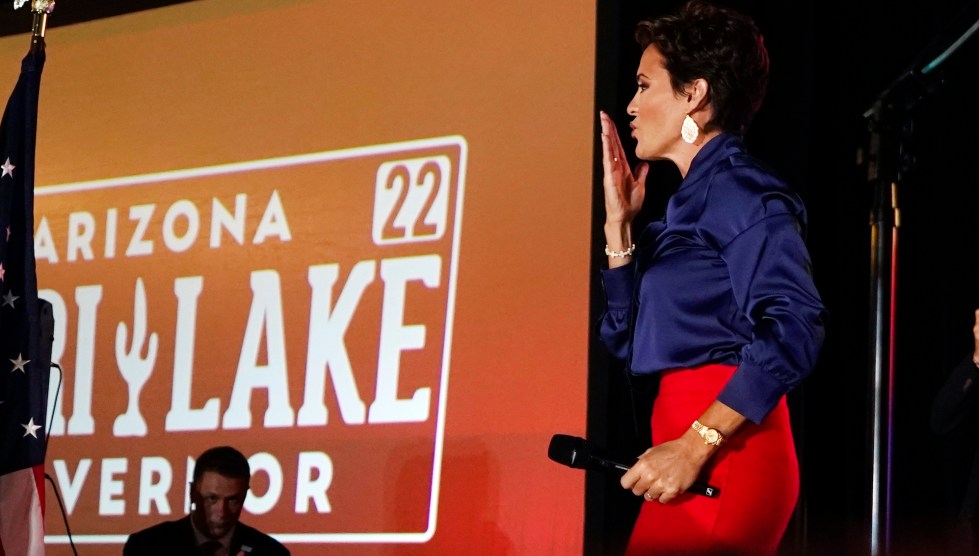
Mother Jones illustration; Getty
In a deep blue Arizona district, a conservative group is spending big bucks to boost the write-in campaign of a Republican activist who led the push for Arizona’s notorious 2021 election “audit”—without telling voters which party he actually belongs to or mentioning his Big Lie advocacy.
The open state senate seat in Arizona’s 22nd legislative district, a majority Hispanic and reliably Democratic stretch of Maricopa County, was supposed to be one thing Democrats in the state didn’t have to worry about this year. In August, Democratic voters nominated state Rep. Diego Espinoza to serve as their next state senator. Republicans didn’t nominate anyone at all.
But one month after the primary, Espinoza quit the race to become a lobbyist. Now Democrats are stuck with his name on the ballot, but votes cast for him will not count. And suddenly what looked like a slam-dunk became anything but. Despite an effort by the local party and major Democratic-aligned groups to consolidate behind a single candidate, public-school teacher Eva Diaz, multiple Democrats have filed to run for the seat anyway. And conservatives, in an audacious strategy first reported by the Arizona Capitol Times, have spent tens of thousands of dollars to try to capitalize on the confusion.
National grassroots Democratic donors have poured money into the race to help Diaz, and in the span of just a few weeks, LD-22 has emerged as an expensive battleground in a state with the highest of stakes. Republicans hold one-vote majorities in both houses of the state legislature. Democrats, facing Midterm headwinds, have little margin for error in their quest to flip the chamber. With Arizona poised to play a key role in how the 2024 presidential election is conducted, and a Civil War-era abortion ban on the books, what happens this fall could have far-reaching implications, in Arizona and beyond. Democrats’ ambitions of flipping the legislature—and keeping an election-denier out of office—hinge on whether Diaz and local Democrats are able to educate voters in time about the process.
“This race is so critical,” Diaz says. “We don’t want it to be in the hands of the MAGA Republican.”
Most Arizona voters cast their ballots early, so Democrats have been up against the clock from the beginning. In mid September, the state and county Democratic parties stepped in to help organize a Zoom meeting, where candidates could make their pitch and LD-22 precinct committee members could vote on who to endorse. After listening to speeches from a number of candidates, a majority of the precinct committee members in attendance voted to back Diaz, who pledged to work on lowering class sizes, defending abortion rights, and protecting the state’s water supply. Afterward, the Arizona Democratic Legislative Campaign Committee issued a statement saying that it was “proud” that the committee members had selected “such a strong candidate” and that “we intend to continue the tradition of Democrats representing this vital district.”
While the ADLCC lists Diaz as the party’s nominee, anyone else could still run. And others did—most notably Steve Chapman, a local school board member who had unsuccessfully sought the support of the LD-22 leaders at the meeting.
Multiple Democrats running write-in campaigns wouldn’t be a big deal to anyone outside the West Valley—let alone Arizona—if it was just a matter of members of one party jostling for power. But after the vacancy, a handful of Republicans filed to run write-in campaigns, too, and people in the district who were going door-to-door for Diaz started hearing reports from voters about one of them in particular.
“People were saying, ‘Oh yeah, we got a text from Steve Robinson—write him in,’” said Tina Gamez, the LD-22 Democratic chair, who is backing Diaz.
Robinson, who filed to run as a write-in candidate in September, is vice-chair of the LD-22 Republican Party, and the co-founder, with his wife, of a conservative political action committee called We the People AZ Alliance. The group, which was founded in December of 2020, is one of the state’s leading proponents of the false narrative that the last presidential election was defined by large-scale voter fraud and malfeasance. Robinson, who has called Donald Trump the “rightful” winner of that election, spoke at a rally outside the state capitol hours after the January 6 insurrection to declare that “the new revolution is upon us.”
“The building up is climaxing and the hour is at hand,” he said. “We the people must begin to separate the good from the bad, the sheep from the wolves, the statesmen from the career politicians.”
He was “drawing a line,” he said, between true patriots and the “tyrannical cowards” who had committed “treason.”
In the ensuing two years, Robinson’s group has raised a quarter-million dollars, with big donations coming from MyPillow CEO Mike Lindell; Overstock.com founder Patrick Byrne; and a PAC founded by Michael Flynn. It played a major role in pushing Republicans in the state Senate to conduct an “audit” of the 2020 election results, and it co-sponsored an “Election Security Forum” featuring Byrne and Kari Lake, the former local TV news anchor who is now the Republican nominee for governor. The most recent tweet on Robinson’s timeline, dated two days after Biden’s inauguration, reads: “If pre-born lives don’t matter then no lives matter!” and links to a press conference for an Arizona bill that would treat abortion as homicide.
Hoping to talk to Robinson, I dropped by the address listed on his campaign website, which is also the headquarters of We the People AZ Alliance. The office’s front window, in a commercial strip off a busy stretch of highway in Glendale, bore a sign with Uncle Sam asking volunteers to join the “Dropbox Watch Force”—part of an effort by conservatives to surveil voting locations in search of the kinds of irregularities that eluded them in 2020. Last week, Phoenix’s ABC affiliate snagged footage of two armed people wearing face masks in a pickup truck surveiling a drop box in Mesa; a few days before, a voter was accosted by someone monitoring a dropbox and accused of being a “mule” while attempting to deposit a ballot.
Robinson wasn’t around. Chris Hansel, a volunteer on the audit of the 2020 election, let me in and told me he’d pass along my message, but I never heard back, and Robinson didn’t respond to emailed requests for comment. While it was clear that Robinson’s PAC was active, there was no visible indication inside that its founder was running for office—no flyers, donuts, or volunteers cutting turf. Of the $15,000 he’s raised, $5,300 apiece (the max contribution) came from Byrne and Jason Hope, a local tech entrepreneur whom Gawker once called “the party king of Scottsdale.”
Robinson’s campaign may be a low-key affair, but the campaign for Steve Robinson is quite aggressive. Earlier this month, voters in the district started receiving literature and text messages informing them, in the same urgent tone as Diaz’s campaign, that Espinoza had dropped out and that they’d have to write-in a replacement. The flyers included a link to a website where they could learn more—WriteInSteveRobinson.com. It looks like it should be Robinson’s campaign site, but it’s not. While Robinson’s considerably more lo-fi site—Robinson4AZ.com—leaves no mystery about his party affiliation, anti-abortion politics, and role with We the People AZ Alliance, the dummy site describes him simply as someone who is fighting to “End the Fentanyl Epidemic,” “Bring Common Sense Solutions to Arizona’s Inflation Crisis,” and “Ensure Equal Access to High-Quality Education.”
Nowhere in the literature or the website does it mention that Robinson is a Republican. You have to read the fine print to learn who’s really paying for this: A conservative organization called the Arizona Free Enterprise Club, whose board members include Dan Brophy, a Jackson Hole retiree whose family has been a major funder of conservative causes in Wyoming, and Randy Kendrick, the wife of the billionaire owner of the Arizona Diamondbacks.
The Club, which did not respond to a request for comment about its involvement, promises through its PAC to help deliver a “red wave” against the “radical woke liberal agenda.” According to the most recent filings with the state, the group has already spent more $70,000 to boost Robinson. To improve Robinson’s odds, the Club is also working to divide the Democratic vote by making a series of independent expenditures on Chapman’s behalf.
“The Free Enterprise Club’s attempt to sabotage the race is concerning because if they successfully split Democratic support in a district that has been a longtime Democratic stronghold—voices are effectively silenced at the State Capitol for constituents in LD-22,” ADLCC’s press secretary Ashton Adams said in a statement.
As Diaz scrambles to stave off challenges from two fronts, outside groups and other local candidates have given her a boost. She has the backing of Arizona List, which backs pro-choice women candidates, and EMILY’s List, the group’s national counterpart. AFSCME and the Arizona’s firefighters union have thrown in their support. So has LUCHA, the Latino community organizing juggernaut.
She’s also gotten a major assist from the States Project, a national organization focused on flipping and holding state legislatures. Its Give Smart program alerts small-dollar donors to the candidates who most need their backing at any given moment. On September 30 the group’s research director, Aaron Kleinman, tweeted that Diaz “needs contributions right now more than any other state legislative candidate in the country”—a message the organization echoed in a blast to its members. Diaz says she has now raised more than $95,000—money that made it possible for a campaign that was starting from scratch to print signs and literature and hire paid canvassers.
When I visited, she was still buzzing about three sisters who had flown to the district from New York and the Bay Area to spend three days knocking on doors for her campaign. Arizona natives, they had found out about the situation through the States Project and made a last-minute decision to help out. One of them, Jill Kauffman Johnson, told me that “we canvassed more than 600 houses, and we had people that had no idea that the guy on the ballot had pulled out.”
Chapman, Diaz’s top Democratic rival, is a lifelong Arizonan with a thick beard who in addition to serving on the Tolleson School Board runs a small consulting business. He insists that he is in the race to win it. His signs call him the “ONLY proven Democrat,” and in an interview he cited his experience working with Republicans on the board as evidence that he’d be able to deliver results no matter which party controls the legislature.
“We have serious needs in our public education. We have serious needs in infrastructure. We do know our voting rights are under attack. We know women’s rights are under attack,” Chapman said. “More important than people that can go down there and say those things, we need people who have experience in building policies and building relationships to try to get that stuff done.”
When I asked about the States Project’s involvement, and the ADLCC’s fears of a divided electorate, Chapman argued that he was giving voters a chance to have a say in the process, and that he’d never considered the district meeting he’d attended to be binding.
“The folks at the States Project, I appreciate the work that they do, but they don’t live here, they’re not the people of LD-22,” he said. “I appreciate the work that the ADLCC does. But again, this is about the people of LD-22—that’s why we’re running.”
After the Diaz campaign and the ADLCC drew attention to the Arizona Free Enterprise Club’s spending on his behalf earlier this week, I followed up with Chapman about the boost he was getting from Republicans. “In no way have I worked with the Free Enterprise Club, now or in the past nor have I sought their support for my campaign,” he said in a statement, noting that any coordination between the candidate and the group would violate campaign finance laws. He accused the Diaz campaign of spreading “misinformation” about his candidacy.
Diaz isn’t leaving anything to chance. After chatting about the campaign at Gamez’s house, she donned a sun hat and set out to knock on doors in a nearby neighborhood. Because voting for her requires a firm grasp of exactly how to vote for her, in-person voter contact is the key to Diaz’s fortunes. Her literature explains that Espinoza dropped out and includes an image of what this part of the ballot will look like with instructions on how to fill it out.
A young man still in his pajamas stepped outside, away from a barking dog, when she knocked on his door. “Eva Diaz!” he exclaimed, surprised to see that the person handing him a flyer was also the person depicted on it. The man’s sister, the voter Diaz was trying to reach, wasn’t home, but he expressed interest in the campaign.
“So Diego Espinoza—”
“He withdrew,” Diaz said.
“He withdrew?” said the man.
She explained the situation and asked if the man had any questions for her.
“Yeah,” he said, rubbing his eyes. “What do you represent?”
“Women’s health care, women’s right to choose, education, I’m a teacher—I’ve been a teacher for 27 years,” she replied. “And our Arizona water supply.”
“I know my sister would definitely be willing to write you in, 100 percent,” he said. “I think it’s really cool you’re boots-on-the-ground right now.”
It was a successful conversation. But as she made her rounds, there was a glimpse, too, of the uncertainty the process had created, in a state where everything is on the line. At an another house, an older man opened the door, and after going over the process for writing her name in, told Diaz he would be voting for her.
Then he paused and asked her one more question, just to be sure.
“You are a Democrat, right?” he said. “Not like one of these Republicans running around trying to rip us off?”

















